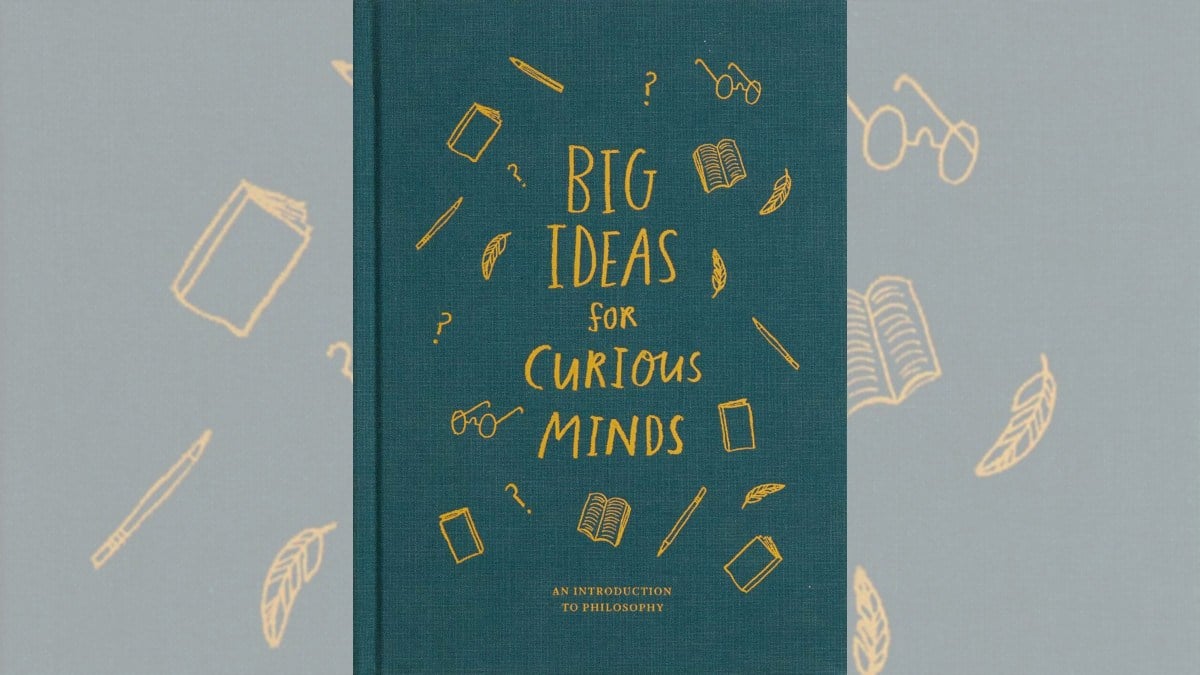This Week’s Word Is “Curious.”
A couple of weeks ago, I was browsing in the shop at the Tate Modern in London. I appreciate this is not the easiest place for many GeekDad readers to get to, but if you’re ever in the area, and looking for something a little different to buy as a gift, it’s well worth a look, particularly if you want to buy a book.
The shop has a host of fabulous and curious books of the type you don’t seem to come across in your average bookshop. Whilst you’re there, you should probably check out some of the art too; after all it’s free to look around.
Whilst in the shop, I stumbled a great looking book called Big Ideas for Curious Minds published by the brilliantly named “School of Life.” Subtitled “An Introduction to Philosophy,” this book is a great way to help your children articulate how they feel about the world.
What Is Big Ideas for Curious Minds?
It’s an illustrated guide to philosophy for younger thinkers aged around 10 upwards. After an introduction that explains what philosophy is and the ways in which it might make the reader’s life a little easier, there are 26 ideas described in the book.
Each “Big Idea” opens with an essay; an accessible explanation that spans 3 or 4 pages. After which it is a single-page description of the philosopher who first posited the idea, with a little context into their life and works. Each philosopher description has a drawing of the philosopher in question alongside it.
The book opens with “Know Yourself – an idea from Socrates.” This short section should be compulsory reading for all parents and children. In fact, everybody. It’s about stopping to think about the cause of your distress. To help your children understand that thing they are currently distressed or angry about might not be the true thing that is bothering them.
This is the first step on the journey of self-discovery that this book is promoting.
This is then followed up by Idea 2, “Learn to Say What’s on Your Mind.” This idea, via Ludwig Wittgenstein, is that nobody can tell what’s going on inside your head and the only way for them to properly understand is for you to explain your thoughts.
It starts by explaining that when you were younger, your parents or other kind people could understand your needs because they were fairly simple; food, sleep, go to the toilet. But as you get older, your thoughts and feelings become increasingly complicated. The kind adults in your life will still try to help, but they might jump to the wrong conclusions, potentially making situations/feelings worse. The book stresses how, even though you might think that your parents won’t understand, they probably will; they were young once and had to deal with complex dynamics too. They may not be able to fully resolve the issue, but they will try to help as much as they can.
And so it goes on:
“It’s hard to know what we really want.” – Simone de Beauvoir.
“No one knows.” – Rene Descartes.
“Maybe you are just tired.” – Matsuo Basho. A valuable essay for parents plagued by eternal “I’m not tired”s.
“Why we hate cheap things.” – Mary Wollstonecraft.
“The need to teach rather than nag.” – Immanuel Kant. Another great essay to share with your family.
And another 15 or so more.
Two of my favorite essays are “What’s Fair?” and “Kintsugi”
“What’s Fair” looks at John Rawls’ idea of the “Veil of Ignorance.”
Fairness is a meaty philosophical subject and this section will ask your child to think about whether life is fair, and how doing the fairest thing is often impossible. It also asks them to imagine which country they would rather be randomly placed in: One with super-rich people, but also the super-poor, or one where nobody is particularly rich (nothing like those in the first example), but also where nobody lives in debilitating poverty. Thorny questions for sure, but important ones if we hoped to build a more equitable society.
“Kintsugi,” examines a Japanese Buddhist philosophy and practice that translates as “golden fixing.” In 16th century Japan, a movement started that stopped throwing away broken pottery but instead mended it with glue and gold dust. You could see clearly where the pot had broken, but the owners did not mind. It was OK to keep hold of something that had once been broken.
This has a resonance for those trying to claw their way back from our consumer society, and the vital importance of recycling, but it takes on a deeper meaning when applied to people, as described in the second part of the essay. The idea that if something is broken, say a friendship or relationship, it may not be irredeemably spoiled. It may be painful, and things may never be quite the same but feelings and friendships can be fixed.
Big Ideas for Curious Minds is a 150 page hardback with a tactile woven cover. After all the essays, there is chronological a list of philosophers included in the book, along with a photo (or a photo of a picture or statue) of each of the book’s thinkers.
Why Read Big Ideas for Curious Minds?
I could write a lot more about the essays included in this book. My family is in quite an introspective phase at the moment. Like many families, there is lots going on, across all generations. The essays are full of “mindful” ideas to help my children understand situations better and understand themselves a little more.
The Wittengentein essay will be perfect for my teenager, and a whole host of them will be useful for my huge-hearted empathetic 11-year-old, who often finds things a little too much. My despotic 7-year-old may well be given a laminated card with “The need to teach rather than nag” on it. My wife and I have understood one another a little better from reading this book together. It’s helped us formulate important questions that have brought us closer together. It’s hard to imagine any greater recommendation than that.
As October turns into November, “Word Wednesday” starts to look towards gifts for the festive season. Big Ideas for Curious Minds is a great book for a gift for grandchildren or perhaps nieces and nephews. It will bring your loved ones closer together.
I think the best Word Wednesday books won’t get much of a look in during the holiday period. There will be bigger, flashier, noisier things to divert the attention. As the luster on the flashier gifts fades and batteries run flat, this book will be waiting to be explored, shared, and admired. It’s a positive and true example of a gift that keeps on giving.
If you want to pick up a copy of Big Ideas for Curious Minds you can do so here in the US and here, in the UK.
If you enjoyed this review please check out my other Word Wednesday posts.
A Note on School of Life Books.
I’d not heard of School of Life before discovering this book, but they have a fascinating array of titles for the more philosophically inclined to take a look at.
I loved their statement of intent on the Curious Minds final page.
“The School of Life is a global organisation dedicated to developing emotional intelligence. We apply psychology, philiosophy and culture to everyday life. We have created a range of throughtful stationery, games and gifts to complement our classes book and videos, to enlighten us about, console us for and explain the human condition.”
Anything that helps us understand who we are can only be a good thing.
Disclosure: I received a copy of this book in order to write this review.






